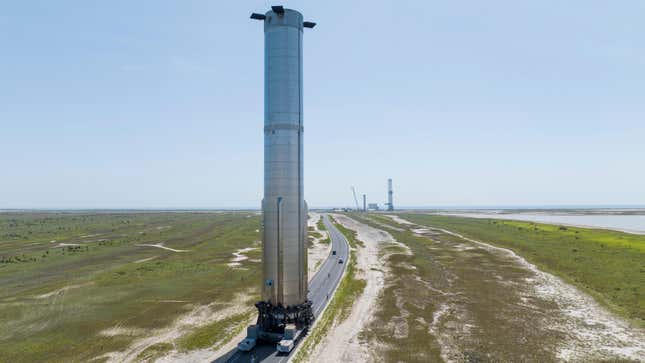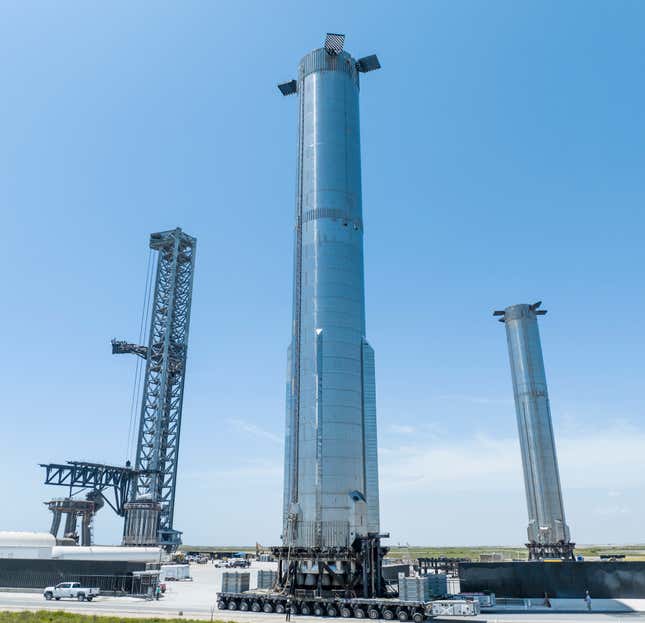
SpaceX’s massive Super Heavy booster stage is now standing (very) tall on the company’s launch pad in south Texas, as it awaits a series of tests and final checks. The company is eager to launch the fully stacked Starship rocket for a flight test as early as July, but a number of regulatory hurdles still stand in the way.
The prototype known as Booster 7 was transported to the Starbase launch site last week for its third and possibly final trip. In a process that lasted from June 23 to 24, B7 was lifted onto the Orbital Launch Mount by a pair of mechanical arms known as “chopsticks,” as NASASpaceflight footage reveals. Booster 7 is notable in that it’s the first flight-ready first stage of the Starship system.
The booster stage, with its 33 Raptor engines, is being prepped for testing at SpaceX’s Boca Chica facility in Texas before its first orbital test flight, when a Starship second stage, or orbital stage, will be stacked on top and launched to space. SpaceX CEO Elon Musk recently claimed that Starship will be ready for its test flight next month, but the company is yet to clear some outstanding regulatory requirements related to its site expansion in Boca Chica.
Starship is made up of a Super Heavy first stage and a Starship second stage, the latter of which has already undergone a series of flight tests (but not to space). Both stages are being designed to perform vertical landings for the purpose of reusability. For the first Starship orbital test flight, however, both stages will perform ocean splashdowns, with the booster performing a partial return and splashdown in the Gulf of Mexico and the booster performing a splashdown off the northwest coast of Kauai, Hawaii. Eventually, the upper stage will land on its own (which it’s done before), while the booster will return to the launch site and perform an assisted landing at the pad; arms at the launch tower will catch the descending booster stage. Well, in theory.

This specific prototype, Booster 7, first headed to the launch pad in March and successfully completed two cryogenic proof tests, but then suffered severe damage during a structural stress test, according to Teslarati. The booster was taken to the factory for repair before rolling out onto the pad for a second time in May, completing a third cryoproof test. Afterwards, the Super Heavy booster spent about six weeks at the factory before its most recent rendezvous with the launch pad.
It’s not yet clear what kinds of tests Booster 7 will undergo on the launchpad or whether SpaceX plans to conduct a full wet dress rehearsal, which involves loading the rocket with fuel and doing a mock countdown for liftoff. For now, the rocket prototype sits on top of the launch pad, supported by two giant arms attached to the launch tower, awaiting its fate.
When stacked on top of one another, those components create the world’s tallest rocket, standing at 394 feet tall (120 meters). The rocket is designed to transport dozens of passengers and cargo to the Moon and further destinations in the Solar System like Mars.
The Federal Aviation Administration (FAA) recently cleared SpaceX for its site expansion, enabling the company to inch closer to the Starship orbital launch. But the FAA did hand SpaceX a list of about 75 environmental mitigation actions that it must complete, in addition to clearing safety hurdles, before it can be granted full permission to launch the gigantic rocket. Aside from the FAA, SpaceX is also facing pushback from the Army Corps of Engineers, who denied the company’s application for site expansion.
More: Florida Tower for Launching SpaceX Starship Rockets Takes Shape.